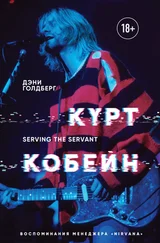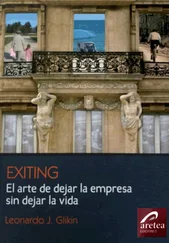Clara Park - Exiting Nirvana
Здесь есть возможность читать онлайн «Clara Park - Exiting Nirvana» весь текст электронной книги совершенно бесплатно (целиком полную версию без сокращений). В некоторых случаях можно слушать аудио, скачать через торрент в формате fb2 и присутствует краткое содержание. ISBN: , Жанр: Психология, на английском языке. Описание произведения, (предисловие) а так же отзывы посетителей доступны на портале библиотеки ЛибКат.
- Название:Exiting Nirvana
- Автор:
- Жанр:
- Год:неизвестен
- ISBN:0-316-69117-8
- Рейтинг книги:4 / 5. Голосов: 1
-
Избранное:Добавить в избранное
- Отзывы:
-
Ваша оценка:
- 80
- 1
- 2
- 3
- 4
- 5
Exiting Nirvana: краткое содержание, описание и аннотация
Предлагаем к чтению аннотацию, описание, краткое содержание или предисловие (зависит от того, что написал сам автор книги «Exiting Nirvana»). Если вы не нашли необходимую информацию о книге — напишите в комментариях, мы постараемся отыскать её.
All illustrations are by Jessy Park.
Exiting Nirvana — читать онлайн бесплатно полную книгу (весь текст) целиком
Ниже представлен текст книги, разбитый по страницам. Система сохранения места последней прочитанной страницы, позволяет с удобством читать онлайн бесплатно книгу «Exiting Nirvana», без необходимости каждый раз заново искать на чём Вы остановились. Поставьте закладку, и сможете в любой момент перейти на страницу, на которой закончили чтение.
Интервал:
Закладка:
Exiting Nirvana is never sentimental, but it is often lyrical, and even allegorical in the universality of its themes. All of us, perhaps, have to move from some primal Eden of self-sufficiency, self-absorption, changelessness, timelessness, into the vicissitudes and frustrations and unpredictabilities of the world, into a life that may be full of growth and adventure, but that threatens continual contingency and risk. It may be — this is certainly a central theme of the book — that this sort of Nirvana can achieve in the autistic an overwhelming, engulfing, annihilating intensity, shutting out the world, in effect, by a timeless absorption in monotonous and repeated activities. Clara Park, in some of the most memorable passages of The Siege, described just this with the eighteen-month-old Jessy; and Temple Grandin (who in referring to her own autism once called herself an «anthropologist on Mars») tells us how she too as a child would «sit on the beach for hours dribbling sand through my fingers and fashioning miniature mountains», blind to the human beings, the human activities and interactions, all about her. We have all, perhaps, dribbled sand in this way, but for the autistic there is a very real danger that such dribbling will engross an entire lifetime. It was this sort of enraptured, timeless, self-stimulating nothingness that Jessy’s parents had to put under siege in the first place. But then the siege became a journey into the possibilities of coexisting in our world, partly by understanding it (which is still possible for Jessy only to a very limited extent), more by learning its (to her unintelligible) rules and customs and values by rote, while at the same time keeping, even strengthening, her own autistic singularity and identity — that immediacy and purity and simplicity of mind which lies at the core of her character and art.
Though Jessy cannot live independently (and never will be able to), and though she requires supervision at work, she does work, with extreme competence and absolute reliability, as a mail clerk. She balances her checkbook; she pays taxes; and (the most difficult, perhaps, for anyone who is autistic) she has come to appreciate something of the feeling of other people, other minds, and of the nature of friends and friendship. And if she has left or renounced Nirvana to some extent, she can recapture it in the stillness, the timelessness, the beauty of her strange paintings. This may, indeed, be as crucial in balancing her life as anything else.
For many years autism was seen as a defensive withdrawal from the world, on the part of a child neglected and alienated by cold, remote parents — Leo Kanner, who identified the condition and named it, spoke of «refrigerator mothers». But there is nothing whatever to support such a notion and everything to refute it. Jessy, the «baby» of her family, has been dearly loved — not only by her parents, but by her siblings — since birth; has perhaps had less trauma than most of us; and gives the impression, for much of the time, of an odd (and, as it were, secret) happiness. Clara Park speaks here of Jessy’s continuing capacity for «autistic delight»:
Once she’d exult over her discovery that «70003 is a prime!»… Then her interest subsided; other things evoked her secret smile. Stars. Rainbows. Clouds. Weather phenomena. Quartz heaters. Odometers. Streetlamps. A strange procession of obsessions, for a year or two eliciting an intensity of emotion approaching ecstasy, then subsiding into mere pleasure. Wordless once, now a word, a phrase, could thrill her. «Asteroid explosion», «digital fluorescent number change».
The obverse of this — and now much rarer — is the piercing cry of desolation that Jessy sometimes emits. The causes of these, Clara Park writes,
were as inexplicable as the causes of her delight. Perhaps her milk was served in a glass instead of her silver cup.. Perhaps one of the six washcloths in the family bathroom was missing… Even when she began to put words together… we were no nearer understanding. It was, we could be sure, never anything that would make another child shriek, it was always trivial, what normal people would call trivial — trivial in everything but its effect on Jessy… By the time she was twelve or thirteen, she could tell us. But what good did it do to know that a lighted window had disrupted the darkness of the building across the street, that a cloud had covered the moon, that she had accidentally caught sight of Sirius…?
These sudden raptures or desolations, though occurring in such trivial (but to her passionately charged) contexts, bring to mind some of the raptures and distresses that creative artists and scientists sometimes have — the ecstatic «Eureka!» of discovery or insight, the sudden feeling of calamity when things do not go right. This is all infinitely far from the emotional dullness, or muting, or «indifference», that is sometimes ascribed to the autistic.
Clara Park speaks of Jessy’s strange happiness as characteristic of her condition. I am not sure that this is so — that autism alone can generate such a temperament or disposition or life-mood. Knowing the Parks somewhat, I can perhaps say what Clara Park herself is too modest to say: that this is a most extraordinary family — the mother a gifted teacher and writer, the father a theoretical physicist, and Jessy’s three older siblings intellectually gifted and accomplished. The Park household is one where eager interest and attention turn in all directions, and where intellectual play and fun are the constant atmosphere. And this is not only a creative and playful family, but a deeply supportive and loving one. Surely some of Jessy’s happiness and confidence, and the diversity of her own interests, must reflect this rare family situation.
Most books about a «condition» or an «afflicted person» are sad if not tragic, even if they strike a note of heroism or bravery. Exiting Nirvana is a great exception, for while it is as deep and unsparing as reality itself, it has a joyous and lyrical quality from beginning to end.
Oliver Sacks
January 2001
Exiting Nirvana

Jessy Park: Judy’s House in Hastings-on-Hudson, 1996.
Chapter 1
Introductory
I low to begin? In bewilderment, I think — that’s the truest way. That’s where we began, all those years ago. That’s where everyone begins who has to do with autistic children. And even now, when my daughter is past forty…
This morning, at breakfast, Jessy reports an exciting discovery. It’s a word. She doesn’t say it quite clearly, but it’s recognizable: «remembrance». «A new fluffy-in-the-middle! Found in the newspaper! It is fluffy in the middle!» Her voice is triumphant, her face is alight. «I saw one! With five on each side!» Leave that unexplained, in all its strangeness. For now. Shift to something less bizarre. Somewhat less bizarre.
Jessy is painting a church. Her acrylics are neatly arranged on the table beside her. With her sable brush and steady hand she has rendered every brick, every curlicue of the Corinthian capital, every nick and breakage in the old stone, accurately, realistically, recognizably. Except that the capital is a vivid, penetrating, astonishing green. The elaborate details of the stonework are picked out in shade upon shade of rose and violet and turquoise and ultra- marine and yellow and green, a different green. The tower thrusts upward into azure sky. Into the blue (five shades, she tells me) she’s introduced three zigzags, one above another, exactly parallel, zig for zag. Lightning, she says. She’s painted lightning before, realistically, recognizably, working from photographs, since lightning, unlike a church, doesn’t hold still for her to sketch it. But no one ever photographed lightning like this, so neatly angular, so controlled. «I invented it!» Happily she explains: it’s what she sees when she has one of her brief migraine episodes. Migraine can be painless; Jessy is quite comfortable with hers. She points out that the zigzags too are colored: «Very pale mint, lavender, and yellow».
Читать дальшеИнтервал:
Закладка:
Похожие книги на «Exiting Nirvana»
Представляем Вашему вниманию похожие книги на «Exiting Nirvana» списком для выбора. Мы отобрали схожую по названию и смыслу литературу в надежде предоставить читателям больше вариантов отыскать новые, интересные, ещё непрочитанные произведения.
Обсуждение, отзывы о книге «Exiting Nirvana» и просто собственные мнения читателей. Оставьте ваши комментарии, напишите, что Вы думаете о произведении, его смысле или главных героях. Укажите что конкретно понравилось, а что нет, и почему Вы так считаете.
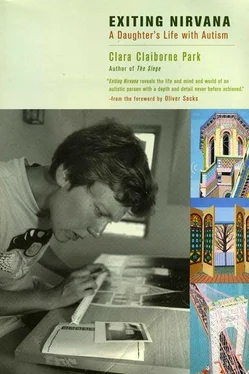
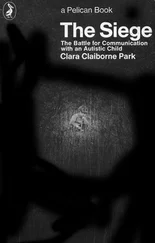
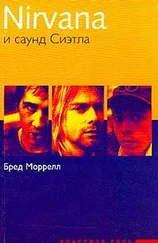
![Майкл Азеррад - Come as you are - история Nirvana, рассказанная Куртом Кобейном и записанная Майклом Азеррадом [litres]](/books/392533/majkl-azerrad-come-as-you-are-istoriya-nirvana-ra-thumb.webp)



![Эверетт Тру - Nirvana - Правдивая история [litres]](/books/399241/everett-tru-nirvana-pravdivaya-istoriya-litres-thumb.webp)
